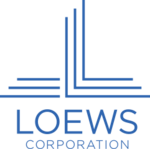Loews Corporation facts for kids
 |
|
| Public | |
| Traded as | |
| Headquarters | Solow Building New York City, United States |
|
Key people
|
|
| Products | insurance, hotels, oil drilling, pipeline transport |
| Revenue | |
|
Operating income
|
|
| Total assets | |
| Total equity | |
|
Number of employees
|
13,000 (2024) |
| Subsidiaries |
|
Loews Corporation is a big American company based in New York City. It's known as a conglomerate, which means it owns many different types of businesses. Some of its main businesses include CNA Financial Corporation (which is about insurance), Boardwalk Pipeline Partners (which moves oil and gas), Loews Hotels (a hotel chain), and Altium Packaging.
Loews Corporation likes to invest in companies for a long time, hoping they will grow in value. The company has also bought back many of its own shares over the years. This means they reduced the number of shares available from 1.3 billion in 1971 to 291 million by 2020.
Contents
History of Loews Corporation
The story of Loews Corporation began in 1946. A person named Laurence Tisch convinced his parents to invest $125,000 to buy a hotel in Lakewood, New Jersey. Soon after, Laurence's brother, Robert, joined the business.
The Tisch brothers used their profits to buy more hotels. By 1956, they had enough money to build their very first hotel, the Americana, in Bal Harbour, Florida. It cost $17 million to build.
Buying Movie Theaters
In 1948, the Supreme Court made an important decision. It ordered all major movie studios, like Metro-Goldwyn-Mayer (MGM), to sell their movie theater chains. This was to make sure no one company had too much control over the movie business.
In 1959, the Tisch brothers bought a large part of Loew's Theatres from MGM. This company owned 102 movie theaters across the country. This purchase was a big step and became the start of the modern Loews Corporation. The company was listed on the New York Stock Exchange in the same year.
By 1960, the brothers were in charge of the company. They noticed that many of the theaters were old. They also realized that the land these theaters were on was very valuable. So, the Tisch brothers started closing and tearing down many of these old movie palaces. They then sold the empty land to builders. This helped bring an end to the grand movie theaters from the Golden Age of Hollywood.
Expanding into New Businesses
The Tisch brothers didn't stop at hotels and theaters. They quickly started to invest in many different types of businesses. This is called diversifying.
In 1968, Loews bought Lorillard Tobacco Company. Then, in 1974, they acquired CNA Financial, which is an insurance company. In 1979, they bought the Bulova Watch Company. Because of these new businesses, Loews's earnings grew a lot. They went from $100 million in 1970 to over $3 billion just ten years later.
Loews sold its movie theater business in 1985. The theaters continued to use the "Loew's" name, but they were no longer owned by Loews Corporation. In the 1980s, Laurence Tisch also briefly owned a big part of the TV and radio company CBS. He even approved the deal that brought the famous TV host David Letterman to CBS. Loews sold its part of CBS in 1995.
Venturing into Energy
In the last 35 years, Loews also started investing in the energy business. In 1989, the company bought Diamond M Drilling. A few years later, in 1992, they bought another company called ODECO, which added 39 oil rigs. These two companies joined together in 1993 and were renamed Diamond Offshore. This company helps drill for oil around the world.
In 2003, Loews bought Texas Gas Transmission, and then Gulf South Pipeline Company in 2004. These two companies became one new company called Boardwalk Pipeline Partners in 2005. Boardwalk Pipeline helps move and store natural gas and other liquids for its customers.
Loews Corporation sold Bulova, the watch company, in 2007 to Citizen Watch. Also in 2007, Loews bought some operations from Dominion Resources for over $4 billion. Loews renamed these assets HighMount Exploration & Production. This company explored for and produced natural gas. HighMount was later sold in 2014.
In 2007, Loews Corporation also announced a plan to separate its ownership of Lorillard, the tobacco company, from the rest of its businesses.
Who Runs Loews Corporation
The founders, Laurence and Robert Tisch, were in charge of the company until 1998. That year, they retired, and a new generation of leaders took over. James Tisch became the president and CEO. His cousins, Andrew Tisch and Jonathan Tisch, also became important leaders. In 2006, Jonathan Tisch and Andrew Tisch were chosen as co-chairmen of the board. All shareholders of Loews Corporation have equal voting rights.
Board of Directors
The people who help guide Loews Corporation are part of its board of directors. As of 2025, some of the members include Ann E. Berman, Joseph L. Bower, Charles D. Davidson, Charles M. Diker, Paul J. Fribourg, Walter L. Harris, Philip A. Laskawy, Susan P. Peters, Anthony Welters, Andrew H. Tisch, James S. Tisch, and Jonathan M. Tisch.
 | Emma Amos |
 | Edward Mitchell Bannister |
 | Larry D. Alexander |
 | Ernie Barnes |


